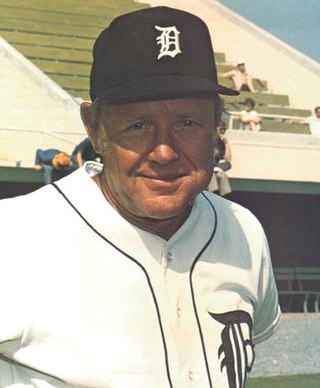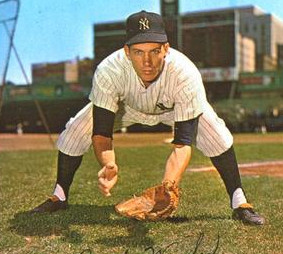Related Research Articles

Edwin Donald "Duke" Snider, nicknamed "the Silver Fox" and "the Duke of Flatbush", was an American professional baseball player. Primarily a center fielder, he spent most of his Major League Baseball (MLB) career playing for the Brooklyn/Los Angeles Dodgers (1947–1962), later playing one season each for the New York Mets (1963) and San Francisco Giants (1964).
The 1960 World Series was played between the Pittsburgh Pirates of the National League (NL) and the New York Yankees of the American League (AL) from October 5–13, 1960. In Game 7, Bill Mazeroski hit the series winning ninth-inning home run, the first time a winner-take-all World Series game ended with a home run, and the first World Series to end on a home run. Mazeroski's home run gave the Pirates their third title overall and their first since 1925.
The 1964 World Series was the championship series of Major League Baseball's (MLB) 1964 season. The 61st edition of the World Series, it was a best-of-seven playoff that matched the National League champion St. Louis Cardinals against the American League champion New York Yankees; the Cardinals prevailed in seven games. St. Louis won their seventh world championship, while the Yankees, who had appeared in 14 of 16 World Series since 1949, did not play in the Series again until 1976.

The 1952 World Series featured the 3-time defending champions New York Yankees beating the Brooklyn Dodgers in seven games. The Yankees won their 4th consecutive title, tying the mark they set in 1936–1939 under manager Joe McCarthy, and Casey Stengel became the second manager in Major League history with 4 consecutive World Series championships. This was the Yankees' 15th World Series championship win, and the 3rd time they defeated the Dodgers in 6 years.

The 1951 World Series matched the two-time defending champion New York Yankees against the New York Giants, who had won the National League pennant in a thrilling three-game playoff with the Brooklyn Dodgers on the legendary home run by Bobby Thomson.

The 1953 World Series was the championship series in Major League Baseball for the 1953 season. The 50th edition of the World Series, it matched the four-time defending champions New York Yankees against the Brooklyn Dodgers in a rematch of the 1952 Series, and the fourth such matchup between the two teams in the past seven seasons. The Yankees won in six games for their fifth consecutive title—a mark which has not been equalled—and their 16th overall. It was also the last of seven consecutive World Series wins by teams from the American League, the longest such streak for the AL in series history. Billy Martin won World Series MVP honors as he hit .500 with a record-tying 12 hits and a walk-off RBI single in Game 6.

The 1955 World Series was the championship series to conclude the 1955 Major League Baseball (MLB) season. The Series matched the National League (NL) pennant winner Brooklyn Dodgers against the American League (AL) pennant winner New York Yankees, with the Dodgers winning the Series in seven games to capture their first championship in franchise history. It would be the only Series the Dodgers won while based in Brooklyn, as the team relocated to Los Angeles after the 1957 season. This was the fifth time in nine years that the Yankees and the Dodgers met in the World Series, with the Yankees having won in 1947, 1949, 1952, and 1953; the Yankees would also win in the 1956 rematch.
Terry Cashman is an American record producer and singer-songwriter, best known for his 1981 hit, "Talkin' Baseball". While the song is well recognized today and allowed Cashman the chance to meet the featured players, it was all but ignored by typical Top 40 radio during its chart life, making only the Billboard Adult Contemporary chart.

Ralph George Houk, nicknamed "the Major", was an American catcher, coach, manager, and front office executive in Major League Baseball. He is best known as the successor of Casey Stengel as manager of the New York Yankees from 1961 to 1963, when his teams won three consecutive American League pennants and the 1961 and 1962 World Series championships. In 1961 he became the second rookie manager to win 100 games in a season and third rookie manager to win a World Series. He was the first manager to win World Series titles in his first two seasons and the first manager since Hughie Jennings to win three pennants in his first three seasons.

Philip Francis Linz was an American professional baseball player. Linz played in Major League Baseball for the New York Yankees (1962–65), Philadelphia Phillies (1966–67), and New York Mets (1967–68). He batted and threw right-handed, and was listed at 6 feet (72 in) and 180 pounds (82 kg), during his playing days.

Cletis Leroy "Clete" Boyer was an American professional baseball third baseman — who occasionally played shortstop and second base — in Major League Baseball (MLB) for the Kansas City Athletics (1955–57), New York Yankees (1959–66), and Atlanta Braves (1967–71). Boyer also spent four seasons with the Taiyō Whales of Nippon Professional Baseball (NPB). In his 16-year big league career, Boyer hit 162 home runs, with 654 runs batted in (RBI), and a .242 batting average, in 1,725 games played.
Yankeeography is a biography-style television program that chronicles the lives and careers of the players, coaches, and other notable personnel associated with the New York Yankees Major League Baseball team. The series is aired on the YES Network and is produced by MLB Productions. The series is hosted by Yankees radio personality John Sterling. The series has earned five New York Sports Emmy Awards since its inception. In addition to airing on YES, MLB Productions has packaged many of the shows into DVD boxed sets.

Henry Roy Hamey was an American front-office executive in Major League Baseball (MLB). A longtime employee of the New York Yankees, he was appointed the club's general manager in November 1960. Inheriting a pennant-winner from his predecessor, George Weiss, he maintained the Yankees' dominant position in MLB by producing three additional American League champions and two World Series champions in three full seasons before retiring in the autumn of 1963. Hamey also spent nine years as the general manager of two National League franchises, the Pittsburgh Pirates and Philadelphia Phillies, during the period between 1947 and 1958.

Baseball's Greatest Hits is the name of two different CD collections of songs and other recordings connected with baseball, released in 1989.
The 1965 New York Mets season was the fourth regular season for the Mets. They went 50–112 and finished tenth and last in the National League. They were managed by Casey Stengel and Wes Westrum. They played home games at Shea Stadium, where they drew 1.77 million paying fans, third in the National League.
The 1964 Major League Baseball season was played from April 13 to October 15, 1964. This season is often remembered for the end of the New York Yankees' third dynasty, as they won their 29th American League Championship in 44 seasons. However, the Yankees lost the World Series to the St. Louis Cardinals in seven games. As of 2023, the Cardinals are the only National League team to have an edge over the Yankees in series played (3–2), amongst the non-expansion teams, despite holding a losing record in World Series games against them (13–15).

The Giants–Yankees rivalry is a Major League Baseball rivalry between the San Francisco Giants of the National League and the New York Yankees of the American League. It was particularly intense when both teams not only inhabited New York City but also, for a time, the same ball park. During that era the opportunities for them to meet could only have been in a World Series. Both teams kicked off the first Subway Series between the two leagues in 1921.

On October 8, 1956, in Game 5 of the 1956 World Series, pitcher Don Larsen of the New York Yankees threw a perfect game against the Brooklyn Dodgers at Yankee Stadium. It was the only no-hitter in World Series history until the Houston Astros pitching staff of Cristian Javier, Bryan Abreu, Rafael Montero and Ryan Pressly threw a combined no-hitter in the 2022 World Series against the Philadelphia Phillies. It remains the only perfect game in the history of the World Series.
The Willie, Mickey and the Duke Award is presented annually by the New York chapter of the Baseball Writers' Association of America to a group of players, or a specific team, who are linked together by a single event or common attribute in baseball history.
References
- ↑ Hall of Fame to honor Terry Cashman
- ↑ ESPN Page 2 article on Cashman
- ↑ ""It's Always Sunny in Philadelphia" the Gang Beats Boggs (TV Episode 2015) - IMDb". IMDb .
- ↑ Talkin' Baseball Songfacts
- ↑ Whitburn, Joel (2002). Top Adult Contemporary: 1961-2001. Record Research. p. 50.
- ↑ "Terry Cashman: Adult Contemporary chart history". Billboard. Retrieved 23 May 2023.